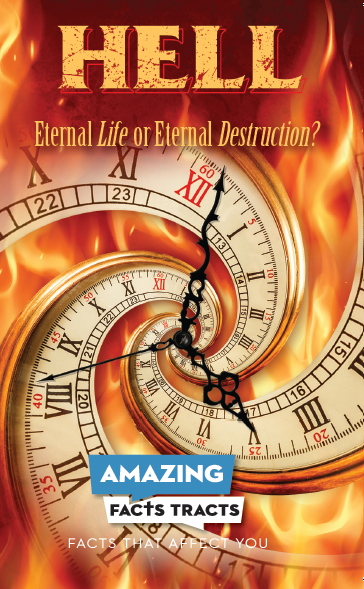
An Amazing Fact: Most Americans know that John F. Kennedy died at the hands of an assassin on November 22, 1963—but few know that two other world-famous men also died that day, two writers who had very different views of eternity: Aldous Huxley, writer of the dystopian novel Brave New World, and C.S. Lewis, writer of the Christian allegory Chronicles of Narnia. Huxley, an agnostic, disdained the thought of life after death, but Lewis presented heaven as a hopeful alternative to a world gone mad. Of course, the Bible clearly promises that an eternity in heaven awaits the saved.
But what about unrepentant sinners? Do they also live forever—only in hell? Will they burn for trillions and trillions of years in hellfire as punishment for their earthly sins? By far, nearly every Christian on Planet Earth believes that billions of souls will suffer for all eternity in hellfire. But is it true? Let’s examine what Scripture says …
What does the Bible actually reveal about hell?
Clear and Unmistakable
The best place to start is with Scripture’s most famous verse:
For God so loved the world that He gave His only begotten Son, that whoever believes in Him should not perish but have everlasting life (John 3:16).
Look carefully: How does this verse actually describe the fate of the lost?
They perish. “To perish” means “to cease to exist.” Someone who exists eternally, even in hell, could not be said to “perish.” The opposite of eternal life is eternal death— not eternal torment.
Furthermore, the apostle Paul says that the lost will be punished with “everlasting destruction” (2 Thessalonians 1:9). What is everlasting? Their destruction! That means the wicked are destroyed forever, a fate radically different than being tormented forever.
Psalm 37:20 says, “The wicked shall perish; … into smoke they shall vanish away.” Does this sound like eternal torment—or eternal destruction?
But what about Jesus? What did He say? Christ contrasted the fate of the saved and the lost in this way: “These will go away into everlasting punishment, but the righteous into eternal life” (Matthew 25:46). There are two ends: “eternal life” and “everlasting punishment.”
The verdict is clear, isn’t it? The final result of punishment is a death that can never be undone.
What About “Eternal Fire”?
Did you know the Bible says that for the city of Sodom’s many sins, it suffered “the vengeance of eternal fire”? (Jude 7). Yet is Sodom still burning on Earth somewhere today? Not according to Scripture, which also says that Sodom was turned to ash. (See 2 Peter 2:6.)
So what does the Bible mean when it says “eternal fire”?
The Hebrew word translated as “eternal” or “everlasting” (olam) can mean something that has been “completed.” For instance, Exodus 21:6 says that a servant was to serve his master “forever,” yet such service ended when the servant died. Also, the prophet Samuel was to remain at the temple “forever” (1 Samuel 1:22), but he too eventually died. Even Jonah said that he was in the belly of the whale “forever” (Jonah 2:6), yet he was there only three days.
But what about when Jesus warned that there would be a hellfire “that shall never be quenched”? (Mark 9:45). Isn’t that a clue that the fires of hell go on forever? Centuries earlier, the prophet Jeremiah also predicted that the palaces of Jerusalem would be burned in a fire that “shall not be quenched” (Jeremiah 17:27). Sure enough, the Babylonians came and burned Jerusalem, just as predicted, yet the fires—the fires that were not to be “quenched”—have, in fact, burned out long ago.
Thus, the warning Jesus gave about hell—that such fires would not be quenched—means the fires will not go out until their work is complete; that is, until the lost are destroyed.
Paul, Peter, and Jesus all warned about the final “destruction” of the lost (Philippians 3:19; 2 Peter 2:1; Matthew 7:13). All three also spoke of the promise of eternal life for the saved (John 17:3; Romans 2:7; 1 Peter 1:4). Again, the opposite of eternal life is not eternal torment; the opposite of eternal life is eternal death.
Eternal Life or Eternal Death?
“The Lord is very compassionate and merciful” (James 5:11). People are rightly justified in rejecting a God who claims to be love while torturing millions in hellfire for eternity for a finite life of sins. The good news is that such a God does not exist!
However, it is equally true that God will not allow unrepentant sinners to live forever. “Just and true are Your ways, O King of the saints!” (Revelation 15:3).
Instead, God offers two possible eternities to you: eternal life on a new earth (2 Peter 3:13), or eternal destruction. The choice is for each individual to make.
Jesus, who did not deserve to die, offered His perfect life for you. When you accept Christ’s offer of salvation, you are saved by His grace and are welcomed into His eternal kingdom. But those who turn from His love and refuse to repent will experience eternal destruction.
Which one will you choose?
WANT TO KNOW MORE?
You can also learn more about death, hell, and the afterlife by downloading your digital copy of Is the Devil in Charge of Hell? study guide by visiting Hell11.AFTV.in
